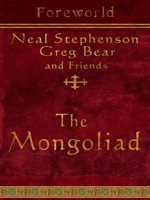 Publishing Perspectives is running an article by Michael Bhaskar looking at Neal Stephenson and Greg Bear’s “collaborative transmedia” project, The Mongoliad (which we previously mentioned here). Like Elizabeth Bear (no relation to Greg)’s Shadow Unit, The Mongoliad is a website to which chapters are posted by the primary authors but in which readers can assay some participation and collaboration.
Publishing Perspectives is running an article by Michael Bhaskar looking at Neal Stephenson and Greg Bear’s “collaborative transmedia” project, The Mongoliad (which we previously mentioned here). Like Elizabeth Bear (no relation to Greg)’s Shadow Unit, The Mongoliad is a website to which chapters are posted by the primary authors but in which readers can assay some participation and collaboration.
The Mongoliad tells a 12th-century alternate history story involving a Mongolian invasion of Europe, with new chapters posted weekly. The chapters involve not just text, but pictures, videos, animations, and other supplemental material. It is supported by a $10 yearly subscription fee—considerably less than the cost of a hardcover book,
Bhaskar’s piece breathlessly calls this “one of the most radical experiments in the history of publishing and writing that, if it works, could reshape the nature of both for generations.” However, as I said for Elizabeth Bear’s Shadow Unit, the only thing really new about this idea is that professional authors are developing it commercially. Maybe they didn’t have access to the modern forms of multimedia Bear’s and Stephenson’s projects use, but Internet writers have been creating collaborative shared universes together since the mid to late 1980s.
Shadow Unit was done more for fun than profit—instead of subscriptions, it is donation-funded, and Elizabeth Bear says the authors involved are “making beer money, and the site is paying for itself.” But whether it’s donations or an inexpensive subscription, this sort of project has a definite advantage over other e-book projects in that when the readers feel like they’ve got a personal stake, no matter how small, they’re more likely to keep paying, and less likely to post material to pirate sites.
The important part here may not be so much the creative material itself as it is the community that builds up around it. People feel closer to the writers and they feel like things they say or do could have a real impact on the world. It’s the same creative impulse that drives people to write fanfic, only in these settings the fanfic could be harnessed and become an actual real part of the setting that the writers can build on.
This is probably also a big reason that these settings proved so popular among Internet writers years before professional writers noticed them—writing that would otherwise be fanfic can instead become fully part of the same setting that inspired its creation. Settings that have been around for a long time can accrete dozens of stories and hundreds of pictures (Internet writers are notably fond of commissioning art of their characters).
As a way to connect with fans and give them a reason to buy, these projects could be helpful to authors, but I’m not sure that they will necessarily be as important as Bhaskar thinks. After all, this kind of project tends to take up a lot of time on the part of the people who write for it and curate fans’ contributions. Such a setting could easily become a full-time job in and of itself—taking up time that the authors could otherwise spend writing more books. And as with MMOs, once a number of these sites start proliferating, the subscription fees and participation time for the readers could mean sites might have to compete for their audience.
Still, those of us who’ve spent years working on and in such projects can feel vindicated that after all this time, the professionsl are beginning to take notice. We were the early adopters, and now it’s time for the idea to go mainstream.

































The project is anti-ebook, from Forum >> Support >> Printing/PDF:
We intend the experience to be interactive, social, and multilayered, and ePub (and other ebook formats) are not consistent with the kind of experience we want to provide. We will soon be supporting iOS (Apple willing), Kindle, Android, and other portable devices, which we hope will satisfy our subscribers’ desire for a more portable Mongoliad, but we have no plans to directly support platforms that we feel compromise the experience we are trying to provide.
They don’t even provide a working RSS feed for subscribers.
This is even though they say they will produce a printed (paper) book after the project is completed. Perhaps they will release that as an ebook.
Considering that it’s basically a no-rules RPG running on a message board, it’s hard to see how an ebook would even be relevant. It would be like trying to use a Kindle to play D&D.
*****
I do like the idea that this is a way for authors to get around the whole question of fanfic. However, I’m left wondering whether this won’t turn out to be like the Star Wars Expanded Universe, where whole swathes of independently-developed canon get wiped out because the main author wants to do something different.